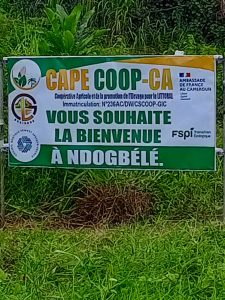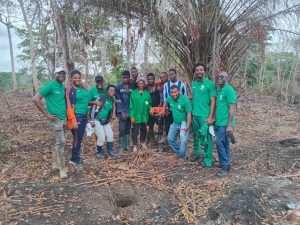 Cameroon : Dr. Yasmine Ndassa, the research scientist turned data storyteller
Cameroon : Dr. Yasmine Ndassa, the research scientist turned data storyteller
 Julien Ngum Che : advocating for the rights of displaced women and youth in Cameroon
Julien Ngum Che : advocating for the rights of displaced women and youth in Cameroon
 Chilufya Mutale Mwila, the Zambian entrepreneur driving financial inclusion across Africa
Chilufya Mutale Mwila, the Zambian entrepreneur driving financial inclusion across Africa
 Wangari Muchiri, the Kenyan engineer committed to accelerating the ecological transition in Africa
Wangari Muchiri, the Kenyan engineer committed to accelerating the ecological transition in Africa


Leading the agricultural cooperative CAPE COOP, which she co-founded in 2020, Sophie Misse Edimo — an accountant by training and a passionate farmer— has spent the past few years championing environmentally friendly farming practices in Cameroon’s Littoral region.
Passionate about farming since childhood and committed to protecting the environment, Sophie Misse Edimo has made the promotion of sustainable agriculture her main focus. It was the troubling observation of environmentally harmful farming practices in her country, Cameroon, that led her, along with about twenty other people, to create the Agricultural and Livestock Promotion Cooperative for the Littoral Region (CAPE COOP) five years ago.“Today, food no longer tastes the way it did many years ago, because of the excessive use of fertilizers,” she told Africa Women Experts. “In the past, our parents practiced organic farming. They didn’t clear vast hectares of land. They mixed crops. The pursuit of absolute profit is killing not only agriculture but also our health. As a consequence of this relentless production, we now have stretches of land that become unusable for 10 to 15 years.”
The cooperative, where she serves as Chair of the Board, has set itself the mission of promoting farming that is environmentally friendly, economically viable, and socially equitable. It established itself in the Nkam region, in Cameroon’s Littoral, where its co-founders come from, with the ambition of practicing ecological agriculture.
On the banks of the Nkam River, the cooperative launched in 2021 a ten-hectare project to grow plantains without fertilizers or pesticides.“This project was dictated by the site itself, because Nkam is an area where plantain is a staple crop,” she explained to Africa Women Experts. “We were looking for a crop that could be grown without any complicated techniques and in harmony with the environment.”Although ambitious, the project unfortunately did not achieve the expected results in its first year.“The production didn’t follow. We had a colossal flop caused by beginner’s mistakes,” she admitted.
Sustainable agriculture in the service of youth economic inclusion


In 2024, the cooperative nonetheless managed to bounce back after being selected for the Solidarity Fund for Innovative Projects (FSPI) – Ecological Transition project, supported by the French Embassy in Cameroon, the farmer explained. The initiative provided the cooperative with eighteen months of support, from 2024 to May 2025, including capacity-building in various technical areas. This assistance helped them get back on their feet, both technically and financially. “When we first worked without the FSPI, we had used our own plantlets purchased in the Centre region. But this time, local residents teamed up to supply us with plantlets, and in return, we paid them what we owed,” she said.
In addition to its commitment to ecology, the cooperative is also working to promote the economic inclusion of young people in the region, which faces high unemployment. “Young people are our main target. We told ourselves that in the economic capital, Douala, they spend their time working as motorcycle taxi drivers—so why not hire them directly?” she said.
Like some companies in parts of Cameroon, the cooperative aims to contribute to empowering young people and become a key driver of employment in the Littoral region. Over just a few years, it has earned the trust of young people who now come seeking work. “At first, people thought this was just another project that would soon disappear, but thanks to our determination, people can count on us today,” she explained.
Looking ahead, the Cameroonian farmer plans to replicate the cooperative’s model in other regions of the country to promote environmentally friendly farming practices nationwide.